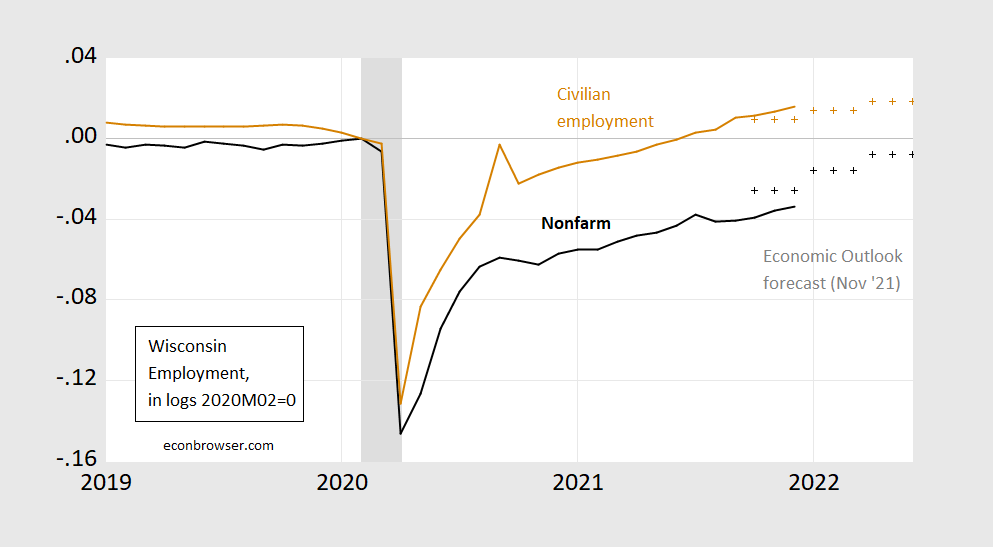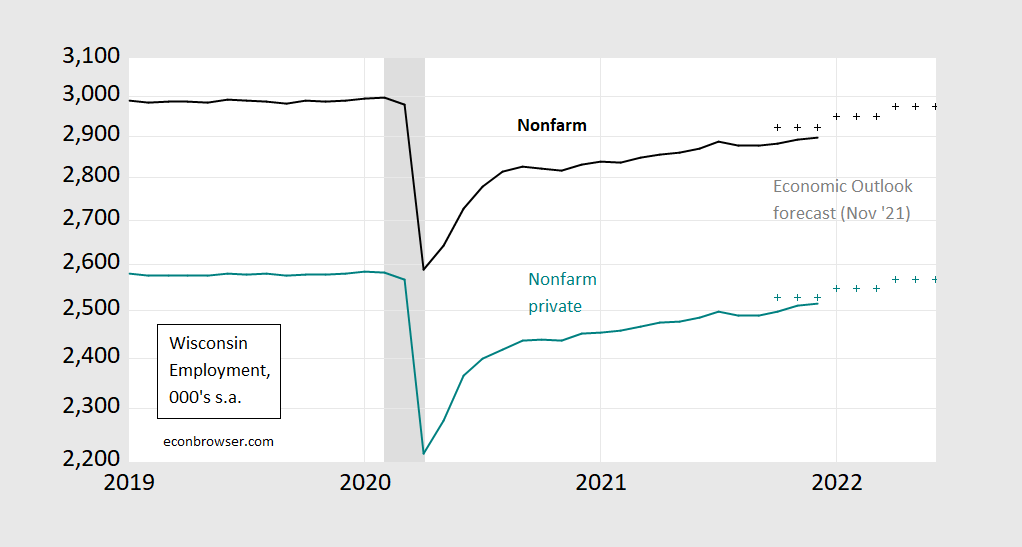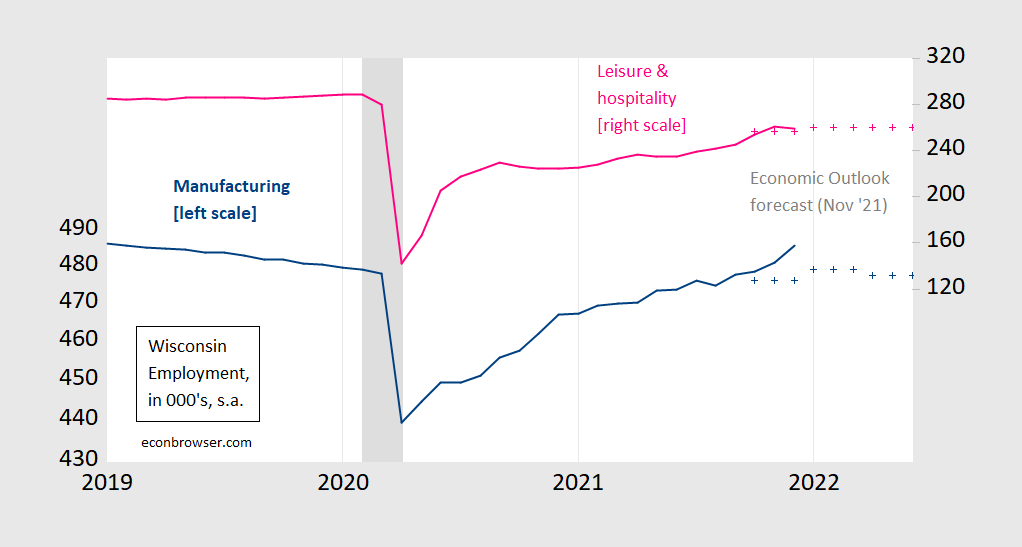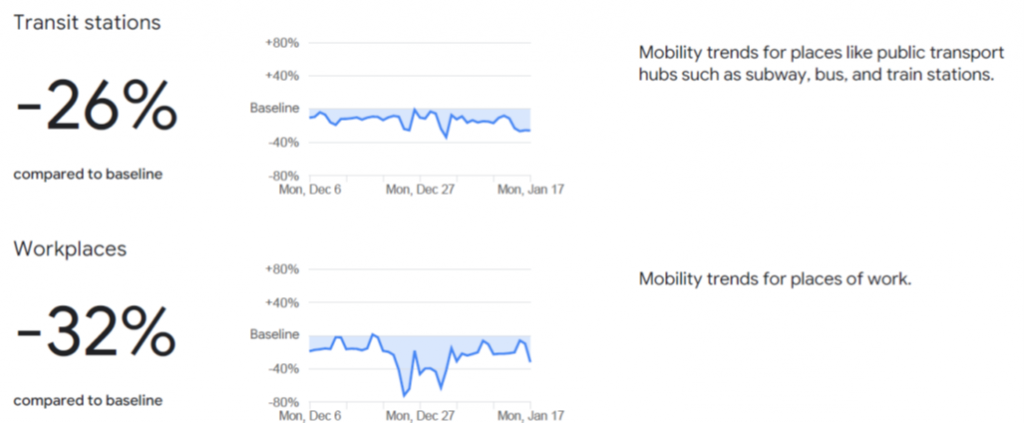DWD released December figures today.
The release makes a few points. Here are my key observations.
- Civilian employment from the household survey (which includes self-employment and agriculture, but is less accurately measured) is above pre-pandemic levels (Figure 1)
- The establishment survey indicates Wisconsin NFP is growing more rapidly than the Nation’s in the last two months, but over the three month change is pretty much the same. Total and private nonfarm employment continue to grow, but are under November DoR forecasts (Figure 2)
- Manufacturing and high contact services employment are outperforming and hitting, respectively, July November DoR forecasts (Figure 3)
- Leisure and hospitality in Wisconsin underpaces the nation, declining in December.
First, overall trends:
Figure 1: Wisconsin nonfarm payroll employment from December release (black), forecast from November 2021 Economic Outlook (black +), civilian employment (brown), forecast from November 2021 Economic Outlook (brown +), all s.a., both normalized to 2020M02=0. NBER defined recession dates peak-to-trough shaded gray. Source: BLS, DWD, and author’s calculations.
From the establishment survey, total nonfarm and private, both under DoR’s November forecast (which should not be surprising, given the December downside surprise in the national employment level).
Figure 2: Wisconsin nonfarm payroll employment from December release (black), forecast from November 2021 Economic Outlook (black +), private nonfarm payroll employment (teal), forecast from November 2021 Economic Outlook (teal +), all s.a. NBER defined recession dates peak-to-trough shaded gray. Source: BLS, DWD, and author’s calculations.
Next, goods producing and high contact services, using manufacturing and leisure and hospitality services as proxies.
Figure 3: Wisconsin manufacturing employment (blue, left log scale), forecast from November 2021 Economic Outlook (blue +), leisure and hospitality services employment (pink, right scale), and forecast from November 2021 Economic Outlook (pink +), all in 000’s, seasonally adjusted. NBER defined recession dates peak-to-trough shaded gray. Source: BLS, DWD, NBER and Wisconsin Department of Revenue.
Manufacturing employment growth is exceeding that in the nation overall +1% versus 0.2% m/m), while leisure and hospitality services employment fell, in contrast to the nationwide change: -0.7% versus +0.3% m/m. (Important to recall that all these December figures are preliminary, and will be revised in the next release; also these employment figures pertain to roughly the second week of December).
The Baumeister et al. Weekly Economic Conditions Indicator indicates continued expansion through 12/31, but continuously decelerating since the week of July 24th.
It’s interesting that hospitality and leisure fell — as did subcategory accommodation and food services by 1.1% — even before the surge in cases in late December. This suggests to me a hit to this category coming again in the January release.
Google mobility indicators show depressed activity relative to baseline, for retail/recreation, transit, and workplaces.
Source: Google, accessed 1/20/2022.
Source: Google, accessed 1/20/2022.





Your comment on the drop in leisure and hospitality pre-Omicron might point to some deeper trends in that sector. Calculated Risk has been tracking numbers in places like Las Vegas and the claw back to 2019 numbers is slooooow. Even if we do a better job with Covid, the recovery of low margin venues is questionable. A hotel that had occupancy rates that were on the edge of profitability prior to the pandemic is probably clobbered now—then it starts to deteriorate physically, lose staff, and drag down the chain restaurant across the parking lot. A mild recession this year or next could result in a small pile of distressed real estate in many regions.
Your missing the point. We don’t know what employment came back and won’t know for years. Government data is flawed. It always has been. 10x now more uncertainty.
Record low unemployment in Wisconsin. With, 97% of our workforce employed and in metro areas approaching 99% (Madison was at 1.4% UE in Nov. and most other metro areas are the same.)
It is obvious to all employers in the state that we need more workers. Perhaps Wisconsin could organize transportation for workers coming across the Southern border or at least be more welcoming to immigrants.
But what is the employment policy proposed by the WIGOP dingbats in the legislature? No need to look at the data and demographic trends in the state – They reached into their Reagan-era talking points bag of zombie economic ideas and decided, we should cut UE benefits. https://www.msn.com/en-us/news/politics/wisconsin-republicans-seek-to-reduce-unemployment-benefits-when-the-economy-is-doing-well/ar-AASUpVM Apparently, the WIGOP is sharing dingbat economic policies with GOP Sen Johnson – who is well known for giving out harmful anti-vax disinformation and has now decided the big problem in Wisconsin is out of wedlock births – straight out of the 50- or 60s- that conservative canard: https://www.yahoo.com/news/ron-johnson-lbj-gop-push-004219842.html
When do Wisconsin voters decide these WIGOP dingbats are holding WI back with their harmful talking points and can not even be bothered to read the press releases from WI Dept of Workforce Development?
For Scabs you mean. That wave has subsided. Things are moving so dialectical fast right now, you can’t keep up.
https://www.nytimes.com/2022/01/17/opinion/new-york-city-wall-street-economy.html
January 17, 2022
Why a Blue City Is Feeling the Blues
By Paul Krugman
Remember when New York City was doomed? The first wave of the Covid-19 pandemic hit the city like a hammer, killing more than 20,000 New Yorkers over the course of a few months. And many commentators asserted that it was New York’s lifestyle — in particular, its uniquely high population density and reliance on mass transit — that made it so vulnerable.
As it turned out, however, this was all wrong. New York suffered badly at the beginning because it’s still America’s leading gateway to the world, so it got heavily infected first, at a time when we didn’t know much about how to protect ourselves from the coronavirus. Since then the city has done pretty well on the health front.
It has not, however, done nearly as well on the economic front. And thereby hangs a tale that’s relevant not just to New York, but to blue America in general.
About the pandemic: During the Delta wave, the combination of high vaccination rates, widespread mask-wearing and public health precautions — you can’t do much indoors in the Big Apple without showing your vaccine card — helped make New York one of the safer places in America, suffering a far lower Covid-related death rate than rural counties or sprawling, car-dependent cities like Dallas. The Omicron wave also hit New York first but appears to be receding fast.
And soaring rental rates, which appear to be more or less back to their prepandemic level, suggest that New York is once again seen as an attractive place to live. Sorry, but I can’t resist quoting the investment manager who declared, “The main problem with moving to Florida is you have to live in Florida.”
Indeed, New York is a great place to live — if you can afford the cost of housing. That last point, however, is a problem, and it lies behind the city’s lagging economic recovery….
https://fred.stlouisfed.org/graph/?g=L3AK
January 15, 2018
Nonfarm employment in New York and Wisconsin, 2017-2021
(Indexed to 2017)
It is a great place to live if you do not mind today’s brutally cold weather. And yes – Omicron cases are coming down (still too high). And he is also correct – “The Rent to Too Damn High”!
Paul Krugman:
New York suffered badly at the beginning because it’s still America’s leading gateway to the world, so it got heavily infected first, at a time when we didn’t know much about how to protect ourselves from the coronavirus. Since then the city has done pretty well on the health front….
[ Severe public health mistakes have been made in New York, though much has surely been known about protection from the coronavirus. Failing to critically examine the public health mistakes made would be additionally distressing. Paul Krugman has been fiercely critical of public health mistakes made beyond New York. Being at least gently critical of New York public health mistakes, is necessary. ]
I would not hope no on in Wisconsin was employed to make those Peloton bikes and they have shut down production due to falling sales. And if anyone bought their stock back in late 2020 for over $150 a share, I hate to tell you that the stock price is now below $25:
https://finance.yahoo.com/quote/PTON/?fr=sycsrp_catchall
https://news.cgtn.com/news/2022-01-21/Chinese-mainland-records-73-confirmed-COVID-19-cases-16ZOUh7quRO/index.html
January 21, 2022
Chinese mainland reports 73 new COVID-19 cases
The Chinese mainland recorded 73 confirmed COVID-19 cases on Thursday, with 23 linked to local transmissions and 50 from overseas, data from the National Health Commission showed on Friday.
A total of 31 new asymptomatic cases were also recorded, and 765 asymptomatic patients remain under medical observation.
Confirmed cases on the Chinese mainland now total 105,484, with the death toll remaining unchanged at 4,636 since January last year.
Chinese mainland new locally transmitted cases
https://news.cgtn.com/news/2022-01-21/Chinese-mainland-records-73-confirmed-COVID-19-cases-16ZOUh7quRO/img/e4dc6aa1b4c94e0a82d3a1d1b3100770/e4dc6aa1b4c94e0a82d3a1d1b3100770.jpeg
Chinese mainland new imported cases
https://news.cgtn.com/news/2022-01-21/Chinese-mainland-records-73-confirmed-COVID-19-cases-16ZOUh7quRO/img/30212099bbd0485caddc490669b3f7d9/30212099bbd0485caddc490669b3f7d9.jpeg
Chinese mainland new asymptomatic cases
https://news.cgtn.com/news/2022-01-21/Chinese-mainland-records-73-confirmed-COVID-19-cases-16ZOUh7quRO/img/3706d1649e5d40c988794d0b4015cc85/3706d1649e5d40c988794d0b4015cc85.jpeg
http://www.chinadaily.com.cn/a/202201/21/WS61ea6a40a310cdd39bc8285a.html
January 21, 2022
Nearly 2.96b COVID-19 vaccine doses administered on Chinese mainland
Nearly 2.96 billion COVID-19 vaccine doses had been administered on the Chinese mainland as of Thursday, data from the National Health Commission showed Friday.
[ January 15, 2022
Over 1.22 billion fully vaccinated against COVID-19 on Chinese mainland. ]
https://www.worldometers.info/coronavirus/
January 20, 2022
Coronavirus
United States
Cases ( 70,544,862)
Deaths ( 883,903)
Deaths per million ( 2,646)
China
Cases ( 105,411)
Deaths ( 4,636)
Deaths per million ( 3)
On an non-economic topic it appears that the right wing yahoos at the National Review thinks Putin is some sort of genius who has owned American Presidents since 2001. Kevin Drum makes the case that Putin is an idiot:
https://jabberwocking.com/vladimir-putin-geopolitical-idiot/
Putin is definitely making a big unforced error with Ukraine. NATO doesn’t want or need Ukraine – nor do they want or need Russia. His paranoia about NATO attacking Russia is idiotic. Even if we ignored the immense destruction from a war with Russia and imagined that NATO could get the country handed to them without a fight, they would say “no thanks”. It is a nationalist basket case with a shrinking population and natural resources that will loose importance and value in the next few decades. On top of that about 1/4 of the population are alcoholics. To think that NATO/US are laying in wait for a chance to take over Russia is paranoid idiocy of the worst kind.
I think Biden has gotten the upper hand here. If Russia attack Ukraine they will have conquered a swamp that will keep costing and costing. It’s not just the cost of occupation itself, it’s also the PR cost of losing credibility and gaining hate from every citizen in every former USSR state. Russia will have gained a small buffer against an insane imaginary “tanks & troops” attack that was never going to happen anyway. Putin had hoped to gain confessions by threatening war. Instead he may have to give some to be saved from his own mistake. My guess is that Biden will accept an agreement that limits the number of tanks and troops on both sides of the Russia/ NATO borders and promises from both to never attack each other. The non-attack promises would be silly (NATO would not attack anyway and Putin has already broken such promises). However, the tanks and troops on each side of the border are verifiable, and could dampen fear in east european countries.
putin is proly figuring how he keeps the 2000 light anti tank weapons the uk delivered to kiev this week from getting in to isis and al qaeda hands….. biden and his blue neocons don’t seem to worry!
and wondering if he has to send more troops to syria to put down isis who are still there under biden.
while us state department authorized the baltic states to send us donated stinger (manportable anti aircraft stuff) and javelins (better anti tank weapon than the brits sent) to ukraine.
i am glad i do not fly commercial any more.
Still too many news cases of Omicron in NYC but new cases per day has fallen by about half of its peak:
https://abcnews.go.com/Health/covid-19-cases-nyc-show-omicron-infections-plummeting/story?id=82271946&utm_source=ABC&utm_medium=web&utm_campaign=omicron
Has anyone seen any data on total ICU occupancy? I’ve seen news snippets talking about some hospitals. But not really a good capacity analysis on capacity. Like if you told me 80% capacity is that normal or not? For refineries, it would be low.
I like the analysis excess deaths, because it deconfounds for “with covid” or “without covid”. For instance US deaths were 2.7-2.8 MM/year for about five years straight. Then we did 3.3+ in 2020 and 2021 each. You can come up with contorted non-Covid explanations (people not checking cancer). But really the Occam’s Razor is the Covid killed them. Takes care of both people missed for Covid and the “with Covid” thing
So, just looking for total ICU beds. Maybe JAN22 vs JAN20.
ICU beds are not a good surrogate marker for strain on hospitals. Omicron doesn’t send a lot of patients to the ICU. It actually doesn’t matter as much for “strain” whether a patient with Covid is in the hospital because of it or for something else. They become more labor intensive when you have to isolate them. So I still prefer the “hospitalized with Covid” metrics as a surrogate marker for how how bad things are. Even the % full (hospital beds or ICU beds) can be a bit misleading because that doesn’t tell us the important parameter of how many qualified care personnel are available per bed.
I agree that the excess death numbers are probably our best way to calculate how many died (directly or indirectly) because of Covid.
OK, but would still like to see it. Total beds filled, total ICU. You can throw in staffing too.
https://www.worldometers.info/coronavirus/
January 20, 2022
Coronavirus
New York
Cases ( 4,755,168)
Deaths ( 63,342)
Deaths per million ( 3,256)
Massachusetts
Cases ( 1,519,783)
Deaths ( 21,295)
Deaths per million ( 3,090)
https://fred.stlouisfed.org/graph/?g=L4DP
August 4, 2014
Real per capita Gross Domestic Product for Russia and Germany, 1990-2020
(Percent change)
https://fred.stlouisfed.org/graph/?g=L4DU
August 4, 2014
Real per capita Gross Domestic Product for Russia and Germany, 1990-2020
(Indexed to 1990)
https://fred.stlouisfed.org/graph/?g=KinA
August 4, 2014
Real per capita Gross Domestic Product for Russia and Germany, 2000-2020
(Percent change)
https://fred.stlouisfed.org/graph/?g=KipC
August 4, 2014
Real per capita Gross Domestic Product for Russia and Germany, 2000-2020
(Indexed to 2000)
[ Possibly Boris Yeltsin was intelligent and Vladimir Putin is unintelligent, but the well-being of Russians improved markedly with the change in leadership. ]
At least to 2010…..since then???? Picking the winners doesn’t last forever Ann.
Interesting observation. Of course the oil price boom did not last forever either.
If you ignore everything but political leadership, which is what political propagandists love to do, then “the well-being of Russians improved markedly with the change in leadership.”
If you look honestly at other factors, you might honestly realize that political leadership isn’t the right place to look.
Reply ↓
For instance, Russia has a shorter life span and lower birth rate than Germany, leading to a widening disparity in dependency ratios:
https://fred.stlouisfed.org/graph/?g=L564
Ignore that and you Ignore reality, also known as the truth.
I guess Anne (ltr) never heard of oil prices. I guess she never heard of the convergence hypothesis either. Germany’s income per capita started off MUCH higher than Russia’s so one would expect the change in real income per capita to be higher in the poorer nation.
Well the recovery of oil prices had a lot to do with your little Putin boom!
So what does a sitting President do if he loses his bid for reelection? If you are President Donald J. Trump you order the military to seize the voter machines:
https://www.politico.com/news/2022/01/21/read-the-never-issued-trump-order-that-would-have-seized-voting-machines-527572
Is that what Trump and Putin were discussing during their meetings?
Rig count out today. -1 oil, +4 gas. Pretty underwhelming, given the very high oil prices right now. (Gas is high too, of course.) Canada up a bunch but that’s just more return to work of the Xmas crowd.
https://rigcount.bakerhughes.com/na-rig-count/
WTI dipped under 85, but I don’t see that as related to rig count.
https://fred.stlouisfed.org/graph/?g=L4V8
August 4, 2014
Real per capita Gross Domestic Product for Russia and Germany, 2007-2020
(Percent change)
https://fred.stlouisfed.org/graph/?g=L4Vh
August 4, 2014
Real per capita Gross Domestic Product for Russia and Germany, 2007-2020
(Indexed to 2007)
https://fred.stlouisfed.org/graph/?g=L4Vs
November 1, 2014
Total Factor Productivity at Constant National Prices for Russia and Germany, 2000-2019
(Indexed to 2019)
https://fred.stlouisfed.org/graph/?g=L4Vz
November 1, 2014
Total Factor Productivity at Constant National Prices for Russia and Germany, 2000-2019
(Indexed to 2000)
https://fred.stlouisfed.org/graph/?g=L593
January 30, 2018
Age dependency ratio for Russia and Germany, * 2000-2020
* Older dependents to working age population
《What we have here is regular, workaday, bread-and-butter pseudoscience. An imitation of the scientific discovery process that works on its own, week after week, month after month, in ~~laboratories~~ economics departments around the world, chasing noise around in circles and occasionally moving forward. And, don’t get me wrong, I’m not saying all this work is completely useless. As I’ve written on occasion, even noise can be useful in jogging our brains, getting us to think outside of our usual patterns. 》(Can I apologize to Andrew Gelman?)
rsm,
Are you aware of experimental economics in which controlled experiments are carried out in labs? This effort uses the scientific method and has established many facts empirically, including showing that many assumptions economic theorists hold about people are not true in general. This has supported behavioral economics, which attempts to study how people actually behave. I note that one of the assumptions that many macro modelers make, rational expectations, has been found not to hold in general. Menzie here has noted that much of his research has been directed at trying to understand foreign exchange movements in a world in which rational expectations do not hold.
Sorry, rsm, aside from your ongoing ignorance and fantasies, there actually is a scientific economics. (Note that I am on top of a lot of developments regarding this matter as I edit the Review of Behavioral Economics).